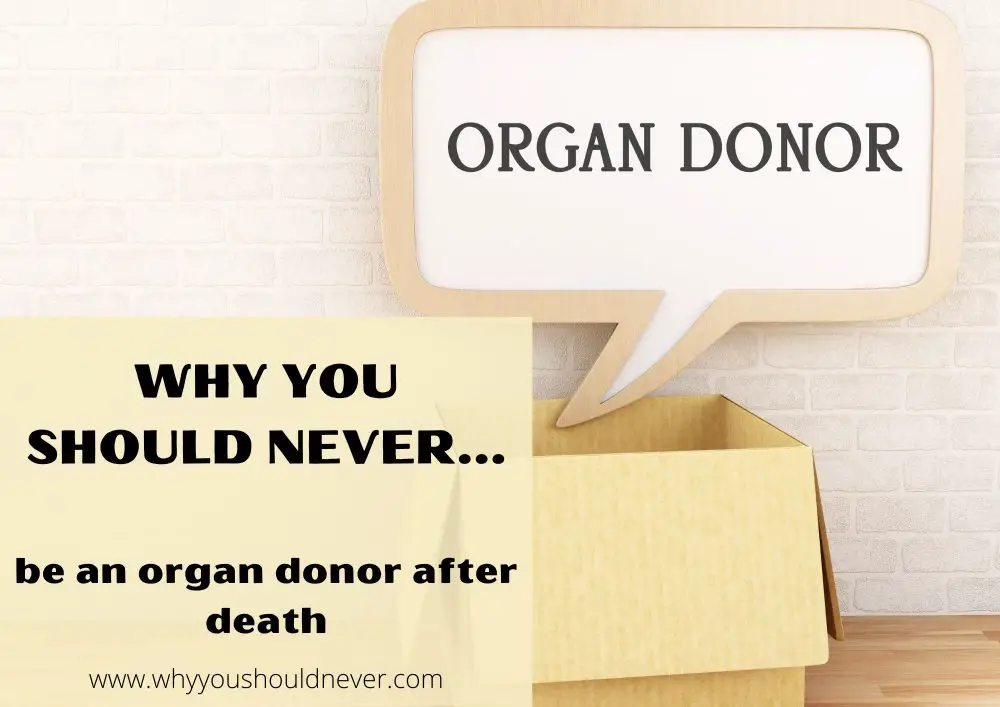![]()
Why You Should Never Be An Organ Donor After Death
So, you’re mulling over that little checkbox on your driver’s license that asks if you’re game to be an organ donor. I get it. It’s a big decision. We’re talking about body parts here. You know, those things that have stuck with you through thick and thin. It’s a dilemma, right?
Do you sign up and potentially save a life down the line, or do you leave this world the way you came into it, all parts intact? I see that furrowed brow. But fear not, I’m here to give you the low-down on some of the cons of becoming a donor. Let’s dive in, shall we?
8 reasons why you shouldn’t be an organ donor after death
1. Embrace your arrival/departure symmetry
Life’s a circle, they say. It begins and ends in eerily similar ways. You arrived here, all innocent and cute, in one piece. Shouldn’t you leave the same way?
Some people hold strong to the idea of bodily integrity even after death. Their belief can stem from personal, cultural, or religious reasons. They see it as a form of respect to themselves or their traditions. They’re all about keeping the full set, heart, kidneys, the lot. And who am I to argue? After all, your body’s your temple.
2. It might be insensitive to your family
This is a tricky one. You might feel like a hero, your organs dashing off to save someone else’s day. But remember, your departure will probably hit your family like a speeding train. They’re reeling, and now they’ve got to grapple with the idea of you, or at least parts of you, being whisked off to another operating room.
It could be downright disturbing to some. A double whammy of sorts. So think about them. Your decision might be their burden.
3. Orchestrated deaths: Conspiracy or not?
Okay, buckle up, because this is where we veer into the land of late-night radio conspiracy theories. There are whispers, tales of ‘orchestrated deaths.’ The idea? That someone, somewhere, could accelerate your demise because, well, they really need that pretty liver of yours.
Now, let’s be clear. There’s no credible evidence to support this, and the medical community globally follows strict protocols and ethics. But if the thought keeps you up at night, maybe check the ‘No’ box. Sleep’s important, after all.
4. The persistent vegetative state conundrum
Here’s a tidbit that’s a little less playful, but way more science-y. Sometimes, it’s tough for doctors to determine if someone is in a persistent vegetative state (PVS) or if there’s still some spark left in the old neural network. There have been instances where patients initially thought to be in PVS have regained consciousness.
Considering that doctors need you in this state in order to harvest your organs, this presents a bit of a quandary. What if you were about to make the mother of all comebacks, but the organ retrieval process got in the way? Talk about a serious buzzkill.
5. The pressure to pull the plug
To piggyback on the previous point, we’ve all seen those hospital dramas where the doctors are whispering urgently about organ shortages, right? Now, I’m not saying that real-life docs are quite that melodramatic, but there’s an undeniable pressure to free up valuable organs. And the only way to do that, unfortunately, is to declare someone dead.
We’d like to think that medical decisions are always 100% unbiased, but let’s not kid ourselves – pressure can sneak its way into the decision-making process.
6. The transplant isn’t always a happy ending
This one’s a bit of a bummer, but it’s important. Even if your organs are harvested and transplanted, it doesn’t always mean a guaranteed happy ending for the recipient. The body might reject the new organ, leading to further complications, or worse, the person may not survive the transplant surgery itself. Do you really want that on your conscience, wherever it’s flown off to?
7. Your organs might not be up to snuff
Picture this. You’ve lived a life of utter indulgence, gourmet cheese and vintage wine, with an occasional jog when guilt strikes. You’ve signed up to be a donor, but when the time comes, your organs might not be in their prime anymore. It’s a bit like offering someone a slightly overripe avocado. Well-intentioned, but perhaps not ideal.
8. Your organs might go to an “undesirable” person
Bit of a controversial one, this. When you agree to donate, you can’t pick and choose who gets your organs. You might have dreams of your liver rescuing a struggling single parent or a bright young scientist.
But the reality? You have no control. Your organs could end up with someone who, let’s say, isn’t the most admirable person. Maybe they’ve lived a life full of choices you disagree with. It’s a lottery, and that uncertainty could be a deal-breaker for some.
Wrapping things up
Now, don’t get me wrong, folks. I’m not saying organ donation is all bad or that it doesn’t save lives. It certainly does, and it’s a noble act of kindness. But like with most things in life, it’s not as straightforward as it might seem.
Whether to be an organ donor after death is not a decision to be taken lightly. You’ve got to be comfortable with it, and more importantly, it’s got to feel right for you. Don’t be rushed, don’t be pressured. Take your time, and when you’re ready, make the choice that suits you best.
